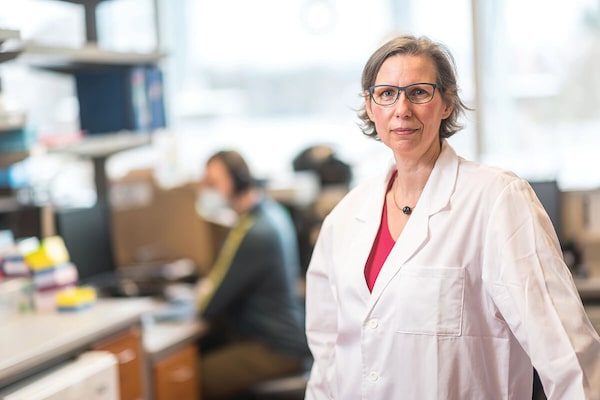Dr. Carolina Tropini (seated) and her team are investigating the roles and complex interactions of gut microbial communities to discover new therapeutics and combat diseases linked to inflammation.UBC
University of British Columbia using living cells for ‘immune system education’
UBC researchers are unlocking the secrets of the immune system to transform how we treat a range of chronic conditions – including type 1 diabetes, multiple sclerosis, inflammatory bowel disease and many more.
Complex biological systems that evolved over millennia to keep us healthy are clashing with rapid recent changes to our lifestyles – a mismatch that seems to be contributing to many of these autoimmune diseases. Carolina Tropini, an assistant professor in UBC’s Department of Microbiology and Immunology and School of Biomedical Engineering, is investigating how radical changes in the way we live have dramatically decreased the diversity of microbes living inside the gut and increased the likelihood of our infection-fighting system running amok.
Dr. Tropini’s research team is examining the roles and complex interactions of the microbial community to understand how the microbes within us affect our health. Some gut microbes, for example, eat dietary fibres, making byproducts that travel to the blood stream and calm inflammation. This potentially offers opportunities to combat diseases linked to inflammation, from Alzheimer’s and depression to rheumatoid arthritis.
While we need our immune system to spark inflammation in order to heal injuries and fight infection, “when inflammation persists for long periods,” says Dr. Tropini, “it affects many processes across the body.” And our modern diets can stoke that fire, in part by not providing our beneficial gut bacteria with the right raw materials.
Dr. Tropini is studying inflammatory bowel disease (IBD) to unravel what happens when such a long-smouldering inflammatory fire is lit early in life. Since the microbiome can change rapidly – including in response to dietary changes – the hope is to one day prevent diseases like IBD. From birth, the microbiota instruct your immune system, “how to decide what’s ‘self’ and what’s dangerous,” Dr. Tropini says. “If we could start a kid from an early age with the right microbiota, then they’re set up with a good immune system education for the rest of their life.”
A living cell-based therapy developed by another group of UBC researchers, and already in human trials, could potentially lead to new treatments for other immune-based diseases like multiple sclerosis and type 1 diabetes. Building on a technology that revs up the immune system to destroy cancer cells, Megan Levings and her colleagues have engineered a specialized subset of white blood cells to have the opposite effect.
“Regulatory T-cells (Tregs) turn off immune responses, which is just as important as turning them on,” explains Dr. Levings, who is a professor in UBC’s Department of Surgery and School of Biomedical Engineering.
Babies with a genetic mutation that disables these cells are born with multiple autoimmune problems. Consequently, says Dr. Levings, “it’s thought that a dysfunction of these Tregs at least partially underlies diseases like MS or type 1 diabetes.”

Dr. Megan Levings and her team have engineered Treg cells that could one day be used to treat many different autoimmune diseases.PAUL JOSEPH, UBC
Earlier attempts to simply take Tregs from a patient, expand their numbers and re-infuse them proved safe “but not as effective as we would have hoped,” Dr. Levings says. Borrowing a concept from a cancer treatment called CAR T-cell therapy, she engineered Tregs with a lab-made protein to get the cells to the right place at the right time, thereby making them as potent as possible.
Current treatments for autoimmune diseases only control symptoms in the short term and come with side-effects such as increased vulnerability to infections and some cancers. Living cell therapies, on the other hand, target the underlying problem: the complex chains of biological steps that trigger undesirable events, such as immune attacks on healthy tissue. Tregs in particular “can do so much more than one drug,” says Dr. Levings, as they can disrupt these damaging chain reactions in multiple ways.
Dr. Levings explains that similar to an air traffic controller, “Tregs tell other cells what they should do. When they get into an environment, they can respond to what’s going on and then make many different signals to amplify the effect. The idea is that with one or maybe a few injections of these Tregs, you would reprogram the person’s own immune system to be better behaved.”
Treg therapy is now being used in human trials in kidney and liver transplant recipients. Because the immune system attacks the ‘foreign’ tissue, transplant patients typically have had to take immune-suppressing drugs for life. Treg therapy could change that, and more. “As the data emerge,” says Dr. Levings, “hopefully these cell-based therapies will prove effective in transplant, and will start to be used in autoimmunity.”
Advertising feature produced by Randall Anthony Communications. The Globe’s editorial department was not involved.